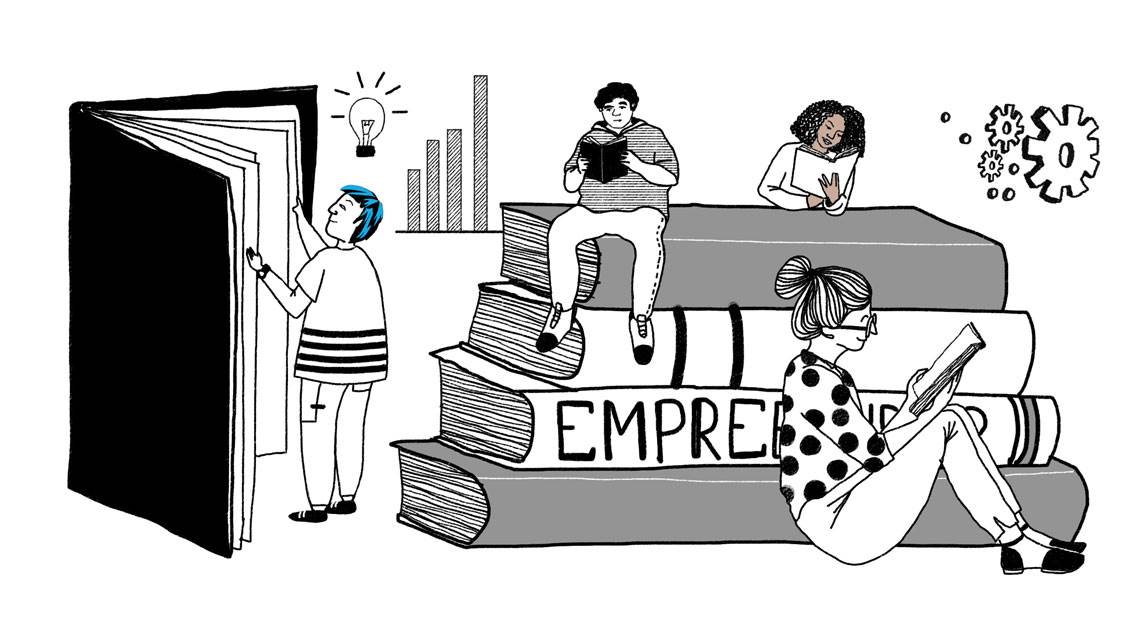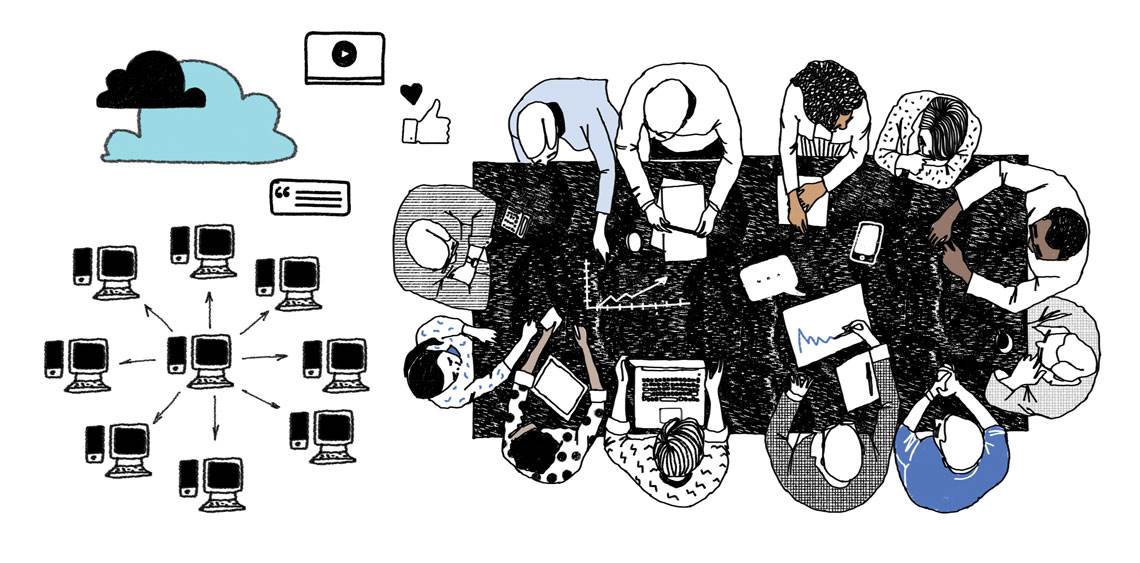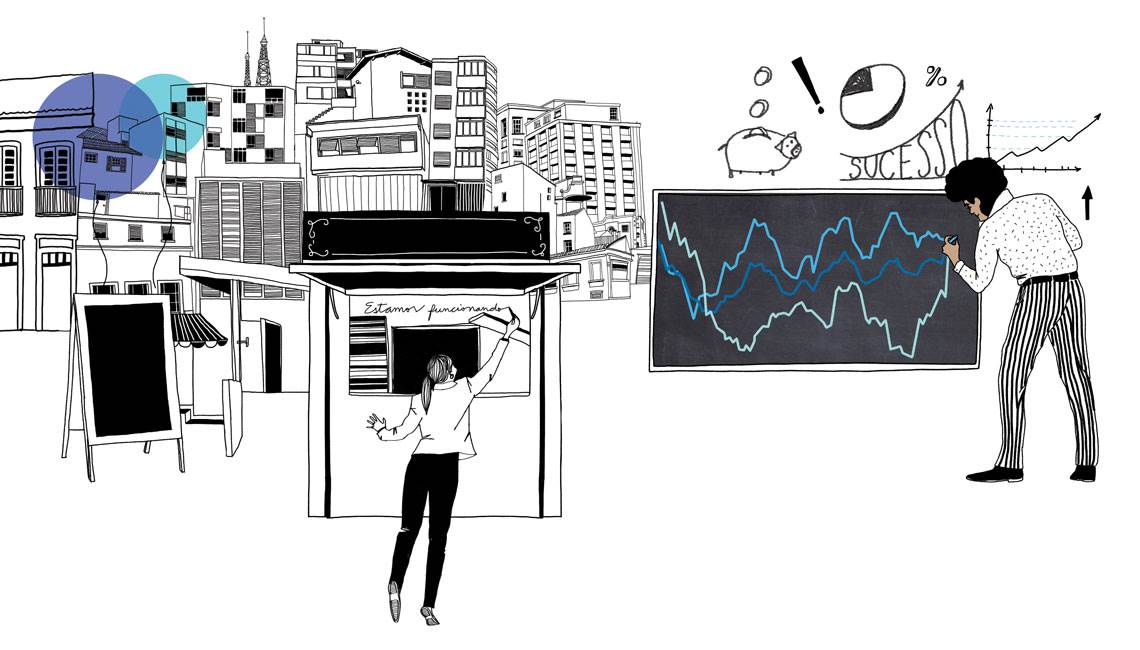Ever since there have been markets, there have been entrepreneurs: people who start, manage, and—all too often—have to wind up businesses. Business administration as a field of knowledge began to develop in the previous century, with a primary focus on management and strategy for large corporates. It was only recently that entrepreneurship became a field of study in its own right, with its own journals, graduate programs, research centers, and university disciplines.
“It’s an offshoot of the field of business administration. Students 30 years ago rarely thought about starting a business: they attended college to then work at a large corporation,” recalls Edgard Barki, coordinator of the Center for Entrepreneurship and New Business at the Getulio Vargas Foundation in São Paulo (FGVCenn). “A lot has changed. The new generation is less interested in working at traditional companies and, thanks to new and disruptive technologies, it is now easier to enter markets,” he says. The field of business administration has followed this trend. “Research interests have expanded from how companies operate to how they are born. And universities are not only researching but also incubating new businesses. It’s a cycle: research, market, teaching.”
In his 2003 article, “Entrepreneurship: The past, the present, the future,” business administration theorist Arnold Cooper (1933–2012), at Purdue University, US, described entrepreneurship as being quite a young field of study, lacking in methodological rigor and researchers. However, he identified growing student interest in the field, and predicted a rapid increase in the number of journals in the area over the ensuing years.
Data in the article, “Produção científica em empreendedorismo no Brasil: Uma revisão de literatura de 2004 a 2020” (Scholarly output on entrepreneurship in Brazil: a review of the literature from 2014 to 2020) suggest that his prediction has been confirmed. The paper, published by researchers at the Federal University of Bahia (UFBA) and Instituto Federal Baiano (IFB), identified a total of 59 journals specializing in entrepreneurship around the world, including publications such as the Journal of Business Venturing and Entrepreneurship: Theory and Practice. In Brazil, a total of 308 academic papers on the subject were published during the study period, according to data from the Scientific Electronic Library Online (SciELO). The most prolific journals were Revista de Administração Contemporânea (RAC), Revista de Administração Mackenzie (RAM), and Cadernos Ebape.
Today, the University of São Paulo (USP) alone has more than 100 disciplines across different schools that are devoted to entrepreneurship, according to the Entrepreneurship disciplines guide published this year by the USP Center for Entrepreneurship (NEU). Artur Vilas Boas, an entrepreneur who received his PhD in business administration from USP and is currently coordinator at NEU, notes that the dot-com crisis in 2000 gave an important boost to the field. “When the dot-com bubble burst, researchers started to look deeper at the different models used to start companies. They soon began to form a body of knowledge, as these new companies grew successful,” he says.
 Adriana Alves
Adriana Alves
A classical field of entrepreneurship research is the business environment, or how easy it is to start, manage, and wind up companies. There are different methods of measuring this.
The report “Subnational Doing Business in Brazil 2021,” published last year by economists at the World Bank on commission from the Federal Government and with support from the Brazilian Support Service for Micro and Small Businesses (SEBRAE), the National Trade Confederation (CNC), and the Brazilian Banking Federation (Febraban), assesses the business environment in major Brazilian cities, including how easy it is to start a business, obtain building permits, register properties, pay taxes, and execute contracts. The survey used interviews and simulations to compare the business environment that entrepreneurs navigate in different countries, states, and cities. Several findings stand out from the survey. The most significant finding relates to bureaucratic processes. Tax disputes amount to approximately 70% of all pending judicial enforcements in the country. And formalities such as obtaining permits take longer than on average in Latin America and the Caribbean.
“Brazil has complex legislation, with four different sales taxes instead of a single value-added tax as in most countries,” wrote Laura Diniz and Erick Tjong, two Brazilian economists at the World Bank who coauthored the study, in an email interview. “Proposed tax reforms currently being discussed in Congress aim to reduce complexity in meeting tax obligations by unifying taxes on sales of goods and services.”
Another methodology is the Entrepreneurial Cities Index (ICE), published by the National School of Public Administration (ENAP) in a partnership with the entrepreneur network Endeavor. The report ranks Brazil’s 100 largest cities on ease of starting a business. Among the primary items it evaluates are the regulatory environment, infrastructure, access to credit, and human capital. The city of São Paulo ranks first, with its large population and proximity to other major centers, which makes it easier for entrepreneurs to network.
One of the purposes of the ranking is to help city managers improve tools to support new entrepreneurs. “There are many different things that city managers can work on to improve their cities’ rank. An entrepreneurial culture is less dependent on governments, but can change as people realize the role that entrepreneurship plays in a country’s prosperity,” notes Claudio Shikida, general research coordinator at ENAP.
Surveys appear to confirm the long-held perception that Brazil is a difficult country to do business in as an entrepreneur
A survey titled “Empreendedorismo no Brasil” (Entrepreneurship in Brazil), published last year by the Global Entrepreneurship Monitor (GEM), an initiative launched in 1999 as a joint venture of Babson College and the London Business School, and which since 2000 has been run by the Brazilian Institute for Quality and Productivity, in a partnership with SEBRAE, uses a conceptual model designed to provide an understanding of the social, cultural, and political context surrounding individuals’ relationship with entrepreneurship. It also provides insights into the “structural conditions underlying the development of entrepreneurship and the possibilities it provides to create value, jobs, and economic development,” says the report.
All surveys appear to confirm the long-held perception that Brazil is a difficult country to do business in, especially as an entrepreneur. Each report bewails the length of time it takes to start a business and the complexity of Brazil’s tax code, which creates an unnecessary cost burden and time wastage.
In the last two decades, however, the country has introduced a number of legislative changes to make the business environment more welcoming. A sole proprietorship framework created in 2008 has reduced the time it takes to start a company, and has allowed small merchants to formalize their business and gain access to credit. In 2019 a new law, called the Economic Freedom Act, was passed to simplify the business environment, and the following year the Bankruptcy Act was reformulated to streamline the court-supervised reorganization process for troubled companies. Last year, Congress approved a Startup Framework to stimulate the business model that has come to define the digital economy.
“Brazil has made good progress, but the changes are likely to only have an impact in the medium term,” says Shikida. “The Economic Freedom Act has been replicated in some cities and states, but not all. In 2008 the federal government also launched Redesim, an information system network for registering and legalizing companies and businesses in different states. The network is designed to simplify the process of starting a business in Brazil.”
Diniz and Tjong, from the World Bank, see the Redesim network as an improvement, but note that implementation has been slow and irregular. “Although it was originally launched in 2007, the corresponding regulatory framework was only approved in 2011. Implementation by state and municipal agencies is optional and requires them to harmonize the different software systems used by trade boards, the Federal Revenue Service, state and municipal tax offices, and other agencies. In 2020 there were still agencies in all major cities that had not yet been integrated,” they report.
“In the last 15 years Brazil has made some progress in improving the business environment and encouraging entrepreneurship. Starting a company is now a faster process. In São Paulo, it went from more than 100 days to just two weeks. In 2020 the process was even faster in many major Brazilian cities. People can now also start sole proprietorships online and for free, in a matter of days,” say Diniz and Tjong.
The proportion of necessity entrepreneurship rose to 50.4% in the first year of the COVID-19 pandemic
Barki believes the reforms have had an impact; they’ve made it easier for entrepreneurs to start businesses and have led to Brazil’s first “unicorns” (startups that reach a market capitalization of US$1 billion or higher) in Brazil. “But further progress is needed. The business environment has improved, red tape is being removed, but the environment still creates more restrictions than it does incentives,” he says, adding that there is a difference between simply staying out of the way and actually implementing public policies that support entrepreneurship. “There are aggressive policies, such as tax incentives, that can effectively drive innovation. One country that has been particularly successful in creating an entrepreneurship ecosystem is Israel.”
During the two years of the pandemic, despite the lockdowns and the migration to an online environment, net new business creation was positive in Brazil. According to the Brazilian Ministry of Finance’s Business Map, 2.6 million more companies were opened than were wound down in 2020. Last year the net balance was 2.3 million. The economic downturn in the period provides part of the explanation: with higher unemployment, many people saw opening a business as their only way out of the crisis. “The pandemic has highlighted the need for more agile and pro-entrepreneurship regulations. Between having no money to pay the bills and starting a business, many decided to start a new venture,” says Shikida.
This is often referred to as “necessity entrepreneurship,” as opposed to “opportunity entrepreneurship.” A person decides to start a company not because they’ve identified a demand in the market, but because they’re experiencing financial distress. According to GEM, the proportion of necessity entrepreneurship rose from 37.5% to 50.4% in 2020, the first year of the COVID-19 pandemic.
“Statistically, when the economy improves, necessity entrepreneurship declines. In general, a good balance exists with approximately 70% opportunity entrepreneurship. Of course there are businesses created out of necessity that will go on to become success stories. But this is rarely the case,” notes Vilas Boas.
Barki is critical of the distinction between opportunity and necessity. “A better understanding is needed of the concept of entrepreneurship. It’s about risk-taking and having a certain kind of mentality. Not everyone wants to own a business; many just want a job. If they become unemployed, however, people will often resort to gigs that can sometimes morph into a business. Can this properly be called entrepreneurship?”
 Adriana Alves
Adriana Alves
Barki’s question denotes the ambiguity there is about definitions, as the term “entrepreneur” is often used to mean different things. In its broadest sense, it is used in business research to mean any individual who starts a company to make a living without answering to a boss. But there is also a narrower definition: a person who makes entrepreneurship their career path.
“There are businesses where people have an entrepreneurial mindset, but they just want to build something small for themselves. Others are looking to scale up and achieve exponential growth,” says Vilas Boas. “The processes are different. In academia, specific theories have been developed for each type of venture. Opening a franchise or a bar, which grows little by little, is not the same as creating a whole new industry or an app, with a view to selling it to investors,” he concludes.
“Exponential” entrepreneurship happens within an ecosystem of supporting organizations, such as accelerators, venture capitalists, and platforms offering specialized services. This has come to be known as the “startup culture,” referring to a term originally used to mean any newly created business, but now mostly applied to tech firms. Meanwhile, says Vilas Boas, there has been a change in the relationship between academia and industry.
It began in the classroom over the last three decades, according to Vilas Boas, who has researched the subject as part of his master’s and doctoral studies. “Professors began to realize that entrepreneurship required new approaches to teaching. They began to introduce project-based activities, such as starting a mock business,” he recalls. In his doctoral thesis, which he defended last year, Vilas Boas argues that training in entrepreneurship now takes place in multiple environments. “Outside the classroom there are now business incubators, startup development programs, and programs where students receive mentoring from professors. Junior companies managed by students are a great starting point,” he claims.
As research centers, universities are well-positioned to build startup incubation hubs. “Colleges have come to understand that innovation is driven by entrepreneurship. So today, developing an entrepreneurial culture has become important in academia,” says Vilas Boas. Now referred to as “academic entrepreneurship,” university involvement in creating and developing new businesses has been a growing trend since the 1980s in the US, as described in a paper titled “Tipologias de empreendedores acadêmicos e limites e possibilidades da integração com empresas e o Estado” (Types of academic entrepreneurs and boundaries and possibilities of integration with industry and government), published last year in the journal Revista Administração em Diálogo. The Bayh-Dole Act (1980), which regulated technology transfer between universities and companies in the US, encouraged integration between academia and industry. In Brazil, the Science, Technology, & Innovation Framework (Law no. 13.243/2016) was created to provide similar incentives.
Strengthening the entrepreneurship and innovation ecosystem is among the goals of FAPESP’s Research for Innovation in Small Businesses (RISB, or PIPE in the Portuguese acronym) program, and in particular the RISB-KT (knowledge transfer) mechanism, launched this year. RISB-KT supports partnerships between universities or science institutes and companies, ranging from startups to mid-market companies. “Universities have always needed funding for prototypes, for example. If researchers have developed a new technology and a company has shown interest in it, we fund this part of the research,” says food engineer Luciana Hashiba, deputy coordinator of Innovation Research on the Science Board at FAPESP.
Hashiba also highlights the RISB-Entrepreneur mechanism, which provides capacity building to companies already served by the program. “Our approach is to find value-creating applications for the technology that companies develop. We conduct surveys with stakeholders, potential customers, and market agents. Some companies end up finding avenues they had not yet thought of, and can better develop their business proposition,” she says.
In March, FAPESP introduced changes to its intellectual property policy and now waives its stake in the earnings of successful ventures. Previously, companies that were successful in their projects owned the intellectual property rights in their products but were required to share their revenue up to the limit of the grant funding they received. “We realized that this created insecurity for companies. The changes are retroactive. Companies with grant agreements predating the changes can amend them to reflect the new provisions,” explains Hashiba.
Scientific articles
Silva Moreira Ferreira, A. da et al. Produção científica em empreendedorismo no Brasil: Uma revisão de literatura de 2004 a 2020. Revista Gestão & Planejamento. vol. 21. 2020.
Fraga da Silva, C. et al. Tipologias de empreendedores acadêmicos e limites e possibilidades da integração com empresas e o Estado. Revista Administração em Diálogo. vol. 23, no. 2. 2021.
